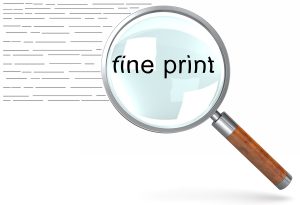Always Read The Fine Print
 Michael Babboni
Personal Injury
Contracts are a common part of doing business in America. Service contracts are especially common between leases, service agreements, and nondisclosure documents. Nowadays, there’s a contract for almost anything including recreational activities. These contracts often contain a section called a liability waiver. Liability waivers are a legally binding contract that lifts the liability of the company providing the service in the case of certain circumstances. Liability waivers don’t seem like a big deal, but if you are injured in an accident, you may be signing away your rights to compensation.
Michael Babboni
Personal Injury
Contracts are a common part of doing business in America. Service contracts are especially common between leases, service agreements, and nondisclosure documents. Nowadays, there’s a contract for almost anything including recreational activities. These contracts often contain a section called a liability waiver. Liability waivers are a legally binding contract that lifts the liability of the company providing the service in the case of certain circumstances. Liability waivers don’t seem like a big deal, but if you are injured in an accident, you may be signing away your rights to compensation.What Is A Liability Waiver?
A liability waiver is often referred to as the “fine print” of a contract, because they are deliberately written in small type and contain complex legalese that the average person does not understand. A liability waiver is basically an agreement between you and another party that relieves the other party of any responsibility for injuries that would normally fall under ordinary negligence. Liability waivers function to serve two purposes. The first, is to relieve the party of any injuries caused by ordinary negligence, even catastrophic injuries. The second, is to provide written proof that the participants were informed of the risks and hazards they are facing. Liability waivers are often deliberately confusing, because they help companies save money on injury claims.
How Does A Liability Waiver Impact An Injury Claim?
Liability waivers are legally binding and may cost you fair compensation during an accident injury claim. There are cases where a contract may not hold up in court, but in general there are some requirements for liability waivers for them to be considered binding:
1. The waiver must be written in clear, easy-to-understand terms that the person signing is absolving the other party of any liability.
2. The liability waiver must be easily seen and not buried in the contract or illegible.
3. The injuries that occurred are specifically mentioned in the waiver in the known and unknown risks portion of the document.
4. Wording of the waiver follows Florida state law and does not violate any state laws or statutes.
5. The liability waiver must be signed by the party.
Finally, liability waivers are only legally binding in the case of ordinary negligence. Liability cannot be waived in the case of gross negligence or defective products.
How To Protect Yourself
Before signing any contract, you need to read the full thing, including the fine print. This can take some time and may require understanding some legal jargon, but it will save you in the case of an injury. If you are uncomfortable with the risk, don’t sign the liability waiver. If you find that you’ve been injured and you unknowingly signed a liability waiver, the only course of action you have is to hire an accident attorney.
How A Personal Injury Attorney Can Help
When you’ve signed a liability waiver, but are severely injured in an accident as the result of the negligence of another party, you only recourse is to hire an accident attorney. An accident attorney will go over the fine print and find any places where they may be in violation of Florida law or used deceitful or tricky language. They will also review the circumstances of the accident and help you determine if it was the result of ordinary negligence or gross negligence. Finally, they can help you negotiate a fair settlement value for your injuries.
So always read the fine print before signing any contract and if you have accidentally or unknowingly signed a liability waiver, speak to The St. Pete’s Lawyer, Michael Babboni. An expert injury attorney, Michael Babboni can review your case and advise you on how to proceed with your injury claim.
